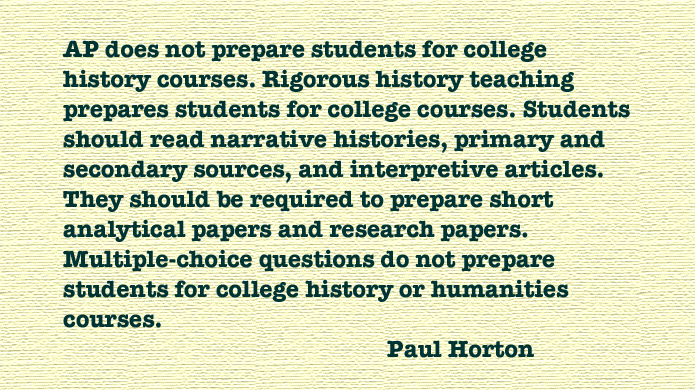The New History Wars Part 3: The College Board is the Real Problem

By Paul Horton.
The Advanced Placement United States History course recently revised by the College Board has recently undergone a second major revision in response to critics from the right who argue that the first revision did not emphasize specific content and that it focused on social history and neglected political and military history.
The second revision responds to these criticisms, but many critics on the right and some who want to see more specific content required continue their criticisms.
Teachers of AP History are growing restless; they have to get on to the teaching of history this year, caught in the middle of a political firefight and another chapter in the culture wars.
The culture wars have no place in history classes except to be taught as a political issue.
Good history is inclusive. Good teachers can combine social history with traditional political and military narratives. Good history teachers understand that religion is a very complex and foundational aspect of United States History. This does not mean that teachers should be teaching “providential history” as some ministers would, it means understanding that the idea of “providential history” has shaped the thinking of some Americans and groups of Americans in very important ways.
The left tends to be identified by the right as promoting social history, identity politics based on victimization narratives, and as hostile to the role of religion in American history. Many veterans don’t believe that the left respects the very real heroism displayed by Americans during wars. There is some truth in this critique because the AP tends to deemphasize military history in favor of free response questions that focus on the more hotly debated issues of race, class, and gender history. On the other hand, the left sees its efforts as attempting to integrate the history of important reform movements, minorities, and political perspectives that were absent from most textbooks and courses until the late seventies as a legacy of Cold War conservatism and McCarthyite anticommunism. So we have a kind of tug of war that intensifies every few years: the debate over the NEH standards in the early and mid nineties is reigniting with the controversy surrounding the Jefferson County, Colorado suspension of the new AP curriculum and the attempts by conservatives to modify the new AP US.
What is written in a textbook or in a set of standards, however, is not history. History is not set in stone. It is The New History Wars Part 3: The College Board is the Real Problem - Living in Dialogue:
